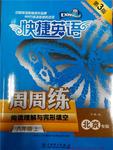题目内容
He let me repeat his instructions_____ sure that I understood what was _____ after he went away.
| A.to make; to be done | B.making; doing | C.to make; to do | D.making; to do |
A
解析试题分析:句意:他让我重复他的指导的目的来确保我能理解在他走后什么事被做。第一空是动词不定时作目的状语,第二空what与to do之间是被动关系,又表示将来,故用to be done;故选A。
考点:考查非谓语动词的用法。
点评:本题难度适中。非谓语动词是近几年高考的热点,本题是对已学知识点的回顾,需要考生能够理解该题的语言环境,进而作出正确的判断。会判断非谓语动词与它的逻辑主语之间是什么关系,需要考生掌握非谓语动词的不同形式的用法区别等。
即学即练:The government plans to bring in new laws _____ parents to take more responsibility for the education of their children.
A. forced B. forcing C. to be forced D. having forced
解析:B。现在分词短语作后置定语,修饰new laws ,相当于which forces …

 快捷英语周周练系列答案
快捷英语周周练系列答案“Everything happens for the best,” my mother said whenever I was disappointed. “Don’t worry. One day your luck will change.”
I didn’t pay attention to her words. After finishing my college education, I decided to look for a job in a radio station. I wanted to host a sports programme. I went to Chicago and knocked on the door of every station. But I got turned down every time.
In one station, a kind lady said to me that I hadn’t got enough experience. “Get to a small station and work for some time,” she said.
When I went back home, my dad told me that a businessman had opened a store and needed someone to help him. But again, I didn’t get the job.
I felt really down. “Your luck will change,” Mum said to me. Later, I tried another radio station in Iowa. But the owner, a nice man, told me he had already had someone to work for him. As I left his office, I asked, “How can someone be a sports announcer (播音员) if he can’t get a job in a radio station?”
I was waiting for the lift when I heard the man call, “What did you mean? Do you know anything about football?” He let me sit in front of a microphone and asked me to try to imagine that I was giving my opinion on a football game, and finally I succeeded.
On my way home, Mum’s words came back to me, “One day your luck will change, Son.”
【小题1】What was the writer’s ideal(理想的) job?
| A.A sportsman. | B.A shop assistant. |
| C.A sports announcer. | D.A businessman. |
| A.Because he was too young. |
| B.Because he didn’t get a college education. |
| C.Because he was not a good-looking person. |
| D.Because he hadn’t got enough experience. |
| A.I was refused every time | B.I was successful every time |
| C.I lost my way every time | D.The door of every station was closed |
| A.in Chicago | B.in his home town |
| C.in a college | D.in Iowa |